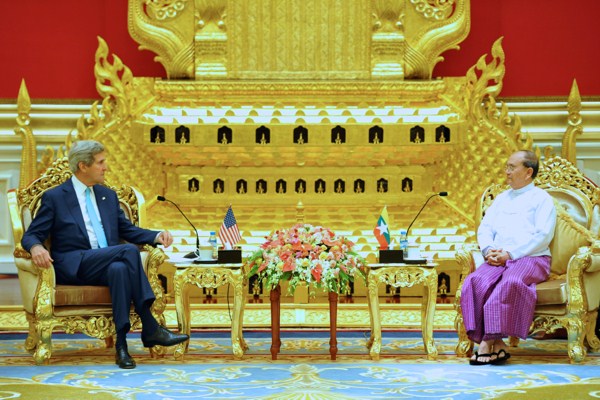In August, as U.S. Secretary of State John Kerry was about to embark on a trip to Myanmar for a set of regional meetings, more than 70 lawmakers drafted a letter to him warning that disturbing developments in the country called for a “significant recalibration” in U.S.-Myanmar ties. Coming more than two years after the Obama administration eased sanctions in response to historic reforms, the incident is just the latest episode revealing ongoing frictions among the White House, Congress and other actors over evolving U.S. policy in Myanmar.
Since the transition from a military dictatorship to a nominally civilian government led by President Thein Sein in March 2011, Myanmar, labeled one of the world’s most repressive regimes for decades, has undergone a series of sweeping reforms. The government has, among other things, freed hundreds of political prisoners, allowed opposition icon Aung San Suu Kyi to re-enter politics after 15 years of house arrest and made some progress toward signing cease-fire agreements with ethnic groups to resolve long-standing hostilities. In line with Obama’s inaugural pledge to “extend a hand” if regimes are willing to unclench their fists, the administration eased sanctions, and Obama himself became the first sitting U.S. president to set foot Myanmar in November 2012.
Developments over the past year, however, have taken some shine off the promise of that initial progress. More than 140,000 Muslim Rohingyas have been displaced following violent attacks; several journalists have been arrested in a renewed crackdown on press freedom; and momentum has stalled on critical constitutional reforms, including those required for Suu Kyi to run in elections in 2015. Despite these setbacks, the Obama administration has continued its cautious engagement of Myanmar. This year has seen a string of high-level visits from U.S. officials, including Secretary of Commerce Penny Pritzker and Trade Representative Mike Froman, in addition to Kerry. And in a foreign policy speech delivered at West Point in May, Obama said that while there was a risk that progress could be reversed, continuing to support reforms there was important because if Myanmar succeeds, Washington would gain a new partner “without having fired a shot.”

